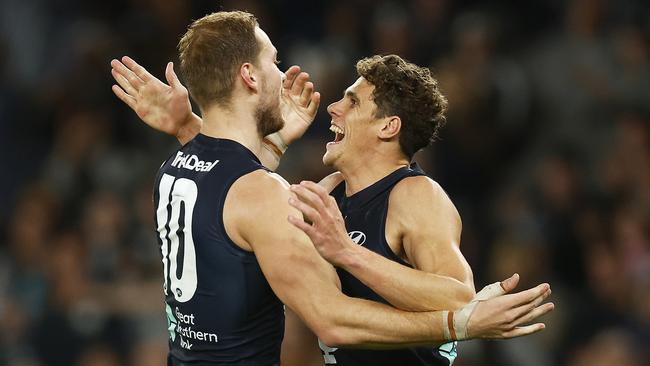AFL 2023: Sam Landsberger takes an in-depth look at what the Harry McKay-Charlie Curnow partnership means for Carlton
Charlie Curnow and Harry McKay are both Coleman Medalists and the Blues pulled off a cheeky plan in order to draft the two big stars, but is it time for the club to make a change?

AFL
Don't miss out on the headlines from AFL. Followed categories will be added to My News.
Harry McKay and Charlie Curnow were drafted minutes apart in 2015 after Carlton enacted a cunning strategy similar to the one that delivered Hawthorn the magical Lance Franklin-Jarryd Roughead quinella in 2004.
Last year, the key forwards were re-signed by the Blues for a combined 13 seasons (Curnow to 2029, McKay to 2030).
The life-changing contracts were announced just six weeks apart.
The Blues’ strategy has seemingly never deviated. They are all-in on their past two Coleman Medallists and believe they can share their forward arc for a generation.
But Jonathan Brown created headlines earlier this year when he called for Carlton to pick up the phone and instigate a bombshell trade – McKay to Sydney.
And suddenly with McKay (knee) injured the football world has marvelled at Curnow as a one-out wildcard.
The unstoppable solo spearhead has thumped 13 goals from his past six quarters playing as the main man.

Curnow is a wildcard who shines brighter as the only man in the spotlight.
From 2021-2023, he has averaged 3.7 goals in games McKay has missed, compared to 2.8 goals when they share supply.
McKay’s numbers also dip – from 3.1 goals to 2.0 – when he goes from the dominant figure to co-pilot.
So, is there actually merit in exploring a move for McKay?
Carlton has conceded publicly that its salary cap is stressed and so offloading Harry would free up millions of dollars to reinvest elsewhere.
That was what Collingwood did last year when it pushed out Brodie Grundy to welcome Tom Mitchell, Bobby Hill and Dan McStay.
But a ring-a-round of Blues greats on Monday shot the suggestion down.
The consensus was that, as Taylor Swift sang, two is better than one.
They said McKay and Curnow were blessed with enough speed to work as a one-two punch and, on Monday night, three-time Coleman Medallist Matthew Lloyd also backed synergy over solo stardom.
“If Curnow is being double or triple-teamed (in the next month) they might go by the end, ‘Gee, we’re looking forward to getting Harry back next year’,” Lloyd told Footy Classified.
Plus, Carlton putting all of its eggs in Curnow’s basket when he missed 43 out of 47 games in one cursed stretch from 2019-2021 would bear a risk bordering on stupidity.
One Blues great also issued a warning to both McKay and Collingwood.
He said Curnow, with space to strut his stuff on the MCG come Friday night, would “chew Darcy Moore” and that McKay’s career would ultimately be “determined” by whether he sorts out his haphazard and erratic kicking.
McKay won the 2021 Coleman Medal while Curnow won last year’s medal and is $1.25 to go back-to-back this year.
That would deliver Carlton three consecutive Colemans, a feat achieved just twice since John Coleman won five in a row himself from 1949-53.
A run of McKay-Curnow-Curnow gongs would follow Geelong, through Gary Ablett Sr in 1993-95, and Hawthorn, through John Peck in 1963-65.

Curnow has booted 19 goals from two games against West Coast and on Saturday became the first Blue to bag 10 goals in 28 years. He is seven goals clear of re-signed Adelaide superstar Taylor Walker with five games remaining.
But the untold story of the goalkicking partnership is how Carlton strategically drafted McKay first in order to boost its chances of securing both big men at picks No. 10 and 12.
The Blues believed that Adelaide, which held the No. 11 pick in between their selections, was far more likely to draft McKay than Curnow.
The Crows had already drafted and delisted Charlie’s older brother, Ed, without playing a game and it was widely believed the mercurial talent’s preference was to stay in Victoria.
So Carlton drafted McKay at No. 10 (before Adelaide’s pick) and then breathed a sigh of relief when the Crows chose local Wayne Milera at No. 11, leaving Curnow available at No. 12.
It sounded similar to Hawthorn’s bold play in 2004.
The Hawks famously overlooked top target Franklin at No. 2 because they were confident they could still get him at No. 5, whereas they suspected Roughead would not make it past Richmond’s No. 4 pick.
The Hawks emerged with Franklin (No. 5) and Roughead (No. 2) – the twin towers they craved – with Richmond settling for Richard Tambling at No. 4 once Roughead was gone.

In 2015, the Blues banked arguably the best two key forwards of the draft, despite Josh Schache (No. 2 to Brisbane Lions) and Sam Weideman (No. 9 to Melbourne) getting taken earlier.
But most clubs ranked Weideman highly and the Blues were perhaps a little fortunate he was gone before they entered the key forward market.
Carlton quickly locked in its future spine that night – crowning key defender Jacob Weitering the No. 1 pick before the Curnow-McKay double that was complemented by father-son selection Jack Silvagni.
But if Matthew Kreuzer had departed as a free agent (he re-signed instead), then there was a chance the Blues might’ve held the first two draft picks.
Under that scenario, it is possible the Blues would have been tempted to partner Weitering with Weideman – most likely at the expense of the McKay-Curnow one-two punch.
And what if the Crows had not played their part in Carlton’s draft plan? Then Milera likely would have lobbed at Ikon Park at No. 12.




